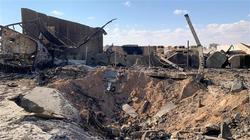 US President Donald Trump has downplayed the traumatic brain injuries suffered by American troops in Iran’s retaliatory missile strike, describing the injuries as “headaches.”
US President Donald Trump has downplayed the traumatic brain injuries suffered by American troops in Iran’s retaliatory missile strike, describing the injuries as “headaches.” RNA - At a press conference at the World Economic Forum in Davos, Switzerland on Wednesday, Trump said military officials told him about the injuries “numerous days” after the strikes on the military bases hosting US forces in Iraq.
“I heard that they had headaches, and a couple of other things, but I would say, and I can report, it's not very serious,” said the president when asked if he doesn’t consider brain injuries as serious.
“I don't consider it very serious relative to other injuries that I've seen,” Trump added.
Also on Wednesday, the US central command spokesman said several more troops had been “identified as having potential injuries” and were being transported to Germany for treatment.
“Given the nature of injuries already noted, it is possible additional injuries may be identified in the future,” Bill Urban said.
Concussions are not always apparent immediately after they've been suffered.
Trump and the Pentagon had initially said that the January 8 Iranian missile strikes had caused no casualties.
Immediately after the Iranian retaliatory missile strike, Trump tweeted that initial casualty assessments were “so far, so good.”
But last week, the Pentagon announced that 11 American troops had been flown to medical hospitals in Germany and Kuwait to be “treated for concussion symptoms from the blast”.
Citing a military official, CNN also said that after the evacuation of the initial 11 troops, more injured soldiers could be identified.
On January 8, the Islamic Revolution Guards Corps (IRGC) fired volleys of ballistic missiles at Ain al-Asad, a large airbase hosting about 1,500 US troops, and another outpost in Erbil, the capital of the semi-autonomous Iraqi Kurdistan.
The missile operation was in response to Washington’s January 3 assassination of top Iranian general Qassem Soleimani, who led the IRGC’s Quds Force.
The assassination also claimed Abu Mahdi al-Muhandis, who was the second-in-command of Iraq’s Popular Mobilization Units (PMU).
The last week Pentagon’s acknowledgment of the 11 injured soldiers and the most recent announcement of additional injuries and the possibility of further casualties and damages, suggests that the impact of the Iranian missile operation were far greater than the Trump administration’s initial assessments.
847/940